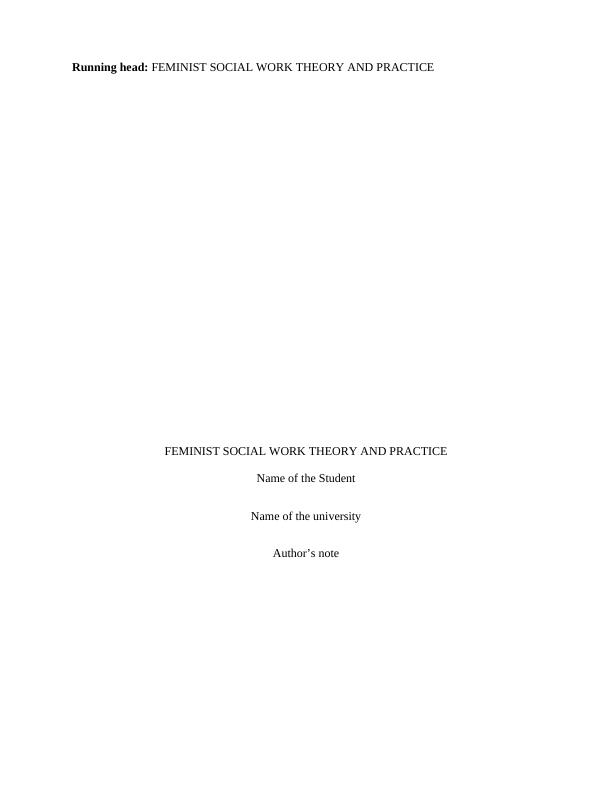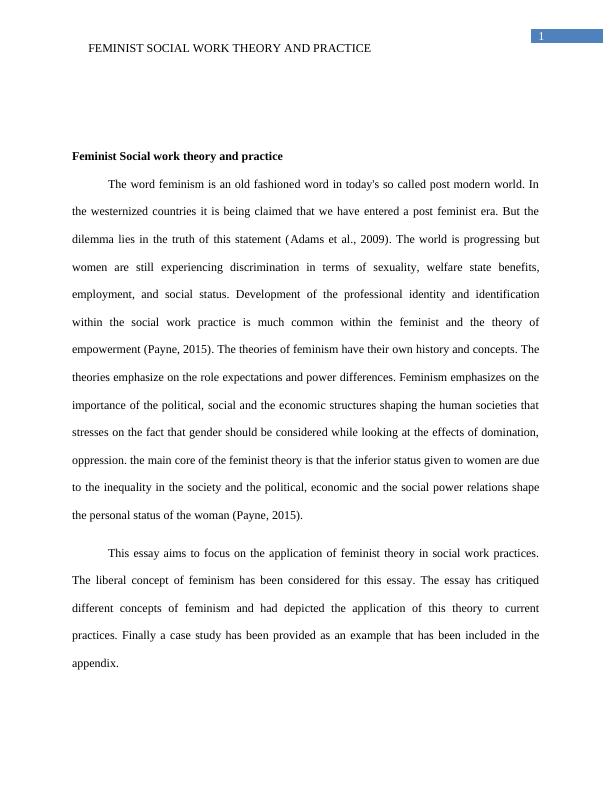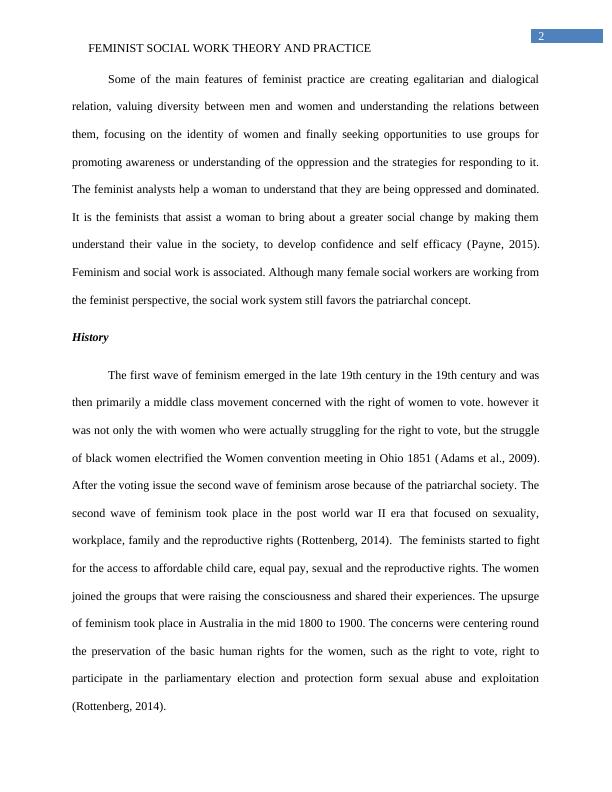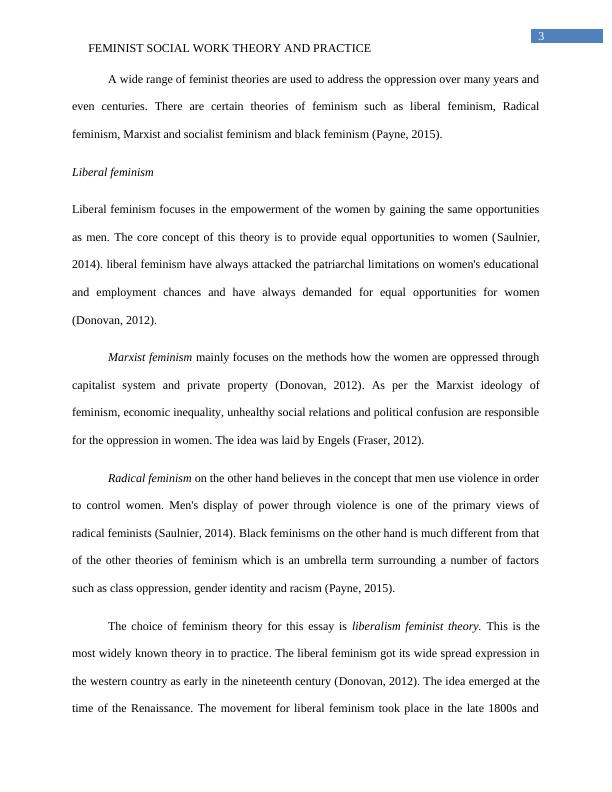Feminist Social Work Theory and Practice
Added on 2023-06-15
17 Pages4455 Words485 Views
Running head: FEMINIST SOCIAL WORK THEORY AND PRACTICE
FEMINIST SOCIAL WORK THEORY AND PRACTICE
Name of the Student
Name of the university
Author’s note
FEMINIST SOCIAL WORK THEORY AND PRACTICE
Name of the Student
Name of the university
Author’s note

1
FEMINIST SOCIAL WORK THEORY AND PRACTICE
Feminist Social work theory and practice
The word feminism is an old fashioned word in today's so called post modern world. In
the westernized countries it is being claimed that we have entered a post feminist era. But the
dilemma lies in the truth of this statement (Adams et al., 2009). The world is progressing but
women are still experiencing discrimination in terms of sexuality, welfare state benefits,
employment, and social status. Development of the professional identity and identification
within the social work practice is much common within the feminist and the theory of
empowerment (Payne, 2015). The theories of feminism have their own history and concepts. The
theories emphasize on the role expectations and power differences. Feminism emphasizes on the
importance of the political, social and the economic structures shaping the human societies that
stresses on the fact that gender should be considered while looking at the effects of domination,
oppression. the main core of the feminist theory is that the inferior status given to women are due
to the inequality in the society and the political, economic and the social power relations shape
the personal status of the woman (Payne, 2015).
This essay aims to focus on the application of feminist theory in social work practices.
The liberal concept of feminism has been considered for this essay. The essay has critiqued
different concepts of feminism and had depicted the application of this theory to current
practices. Finally a case study has been provided as an example that has been included in the
appendix.
FEMINIST SOCIAL WORK THEORY AND PRACTICE
Feminist Social work theory and practice
The word feminism is an old fashioned word in today's so called post modern world. In
the westernized countries it is being claimed that we have entered a post feminist era. But the
dilemma lies in the truth of this statement (Adams et al., 2009). The world is progressing but
women are still experiencing discrimination in terms of sexuality, welfare state benefits,
employment, and social status. Development of the professional identity and identification
within the social work practice is much common within the feminist and the theory of
empowerment (Payne, 2015). The theories of feminism have their own history and concepts. The
theories emphasize on the role expectations and power differences. Feminism emphasizes on the
importance of the political, social and the economic structures shaping the human societies that
stresses on the fact that gender should be considered while looking at the effects of domination,
oppression. the main core of the feminist theory is that the inferior status given to women are due
to the inequality in the society and the political, economic and the social power relations shape
the personal status of the woman (Payne, 2015).
This essay aims to focus on the application of feminist theory in social work practices.
The liberal concept of feminism has been considered for this essay. The essay has critiqued
different concepts of feminism and had depicted the application of this theory to current
practices. Finally a case study has been provided as an example that has been included in the
appendix.

2
FEMINIST SOCIAL WORK THEORY AND PRACTICE
Some of the main features of feminist practice are creating egalitarian and dialogical
relation, valuing diversity between men and women and understanding the relations between
them, focusing on the identity of women and finally seeking opportunities to use groups for
promoting awareness or understanding of the oppression and the strategies for responding to it.
The feminist analysts help a woman to understand that they are being oppressed and dominated.
It is the feminists that assist a woman to bring about a greater social change by making them
understand their value in the society, to develop confidence and self efficacy (Payne, 2015).
Feminism and social work is associated. Although many female social workers are working from
the feminist perspective, the social work system still favors the patriarchal concept.
History
The first wave of feminism emerged in the late 19th century in the 19th century and was
then primarily a middle class movement concerned with the right of women to vote. however it
was not only the with women who were actually struggling for the right to vote, but the struggle
of black women electrified the Women convention meeting in Ohio 1851 (Adams et al., 2009).
After the voting issue the second wave of feminism arose because of the patriarchal society. The
second wave of feminism took place in the post world war II era that focused on sexuality,
workplace, family and the reproductive rights (Rottenberg, 2014). The feminists started to fight
for the access to affordable child care, equal pay, sexual and the reproductive rights. The women
joined the groups that were raising the consciousness and shared their experiences. The upsurge
of feminism took place in Australia in the mid 1800 to 1900. The concerns were centering round
the preservation of the basic human rights for the women, such as the right to vote, right to
participate in the parliamentary election and protection form sexual abuse and exploitation
(Rottenberg, 2014).
FEMINIST SOCIAL WORK THEORY AND PRACTICE
Some of the main features of feminist practice are creating egalitarian and dialogical
relation, valuing diversity between men and women and understanding the relations between
them, focusing on the identity of women and finally seeking opportunities to use groups for
promoting awareness or understanding of the oppression and the strategies for responding to it.
The feminist analysts help a woman to understand that they are being oppressed and dominated.
It is the feminists that assist a woman to bring about a greater social change by making them
understand their value in the society, to develop confidence and self efficacy (Payne, 2015).
Feminism and social work is associated. Although many female social workers are working from
the feminist perspective, the social work system still favors the patriarchal concept.
History
The first wave of feminism emerged in the late 19th century in the 19th century and was
then primarily a middle class movement concerned with the right of women to vote. however it
was not only the with women who were actually struggling for the right to vote, but the struggle
of black women electrified the Women convention meeting in Ohio 1851 (Adams et al., 2009).
After the voting issue the second wave of feminism arose because of the patriarchal society. The
second wave of feminism took place in the post world war II era that focused on sexuality,
workplace, family and the reproductive rights (Rottenberg, 2014). The feminists started to fight
for the access to affordable child care, equal pay, sexual and the reproductive rights. The women
joined the groups that were raising the consciousness and shared their experiences. The upsurge
of feminism took place in Australia in the mid 1800 to 1900. The concerns were centering round
the preservation of the basic human rights for the women, such as the right to vote, right to
participate in the parliamentary election and protection form sexual abuse and exploitation
(Rottenberg, 2014).

3
FEMINIST SOCIAL WORK THEORY AND PRACTICE
A wide range of feminist theories are used to address the oppression over many years and
even centuries. There are certain theories of feminism such as liberal feminism, Radical
feminism, Marxist and socialist feminism and black feminism (Payne, 2015).
Liberal feminism
Liberal feminism focuses in the empowerment of the women by gaining the same opportunities
as men. The core concept of this theory is to provide equal opportunities to women (Saulnier,
2014). liberal feminism have always attacked the patriarchal limitations on women's educational
and employment chances and have always demanded for equal opportunities for women
(Donovan, 2012).
Marxist feminism mainly focuses on the methods how the women are oppressed through
capitalist system and private property (Donovan, 2012). As per the Marxist ideology of
feminism, economic inequality, unhealthy social relations and political confusion are responsible
for the oppression in women. The idea was laid by Engels (Fraser, 2012).
Radical feminism on the other hand believes in the concept that men use violence in order
to control women. Men's display of power through violence is one of the primary views of
radical feminists (Saulnier, 2014). Black feminisms on the other hand is much different from that
of the other theories of feminism which is an umbrella term surrounding a number of factors
such as class oppression, gender identity and racism (Payne, 2015).
The choice of feminism theory for this essay is liberalism feminist theory. This is the
most widely known theory in to practice. The liberal feminism got its wide spread expression in
the western country as early in the nineteenth century (Donovan, 2012). The idea emerged at the
time of the Renaissance. The movement for liberal feminism took place in the late 1800s and
FEMINIST SOCIAL WORK THEORY AND PRACTICE
A wide range of feminist theories are used to address the oppression over many years and
even centuries. There are certain theories of feminism such as liberal feminism, Radical
feminism, Marxist and socialist feminism and black feminism (Payne, 2015).
Liberal feminism
Liberal feminism focuses in the empowerment of the women by gaining the same opportunities
as men. The core concept of this theory is to provide equal opportunities to women (Saulnier,
2014). liberal feminism have always attacked the patriarchal limitations on women's educational
and employment chances and have always demanded for equal opportunities for women
(Donovan, 2012).
Marxist feminism mainly focuses on the methods how the women are oppressed through
capitalist system and private property (Donovan, 2012). As per the Marxist ideology of
feminism, economic inequality, unhealthy social relations and political confusion are responsible
for the oppression in women. The idea was laid by Engels (Fraser, 2012).
Radical feminism on the other hand believes in the concept that men use violence in order
to control women. Men's display of power through violence is one of the primary views of
radical feminists (Saulnier, 2014). Black feminisms on the other hand is much different from that
of the other theories of feminism which is an umbrella term surrounding a number of factors
such as class oppression, gender identity and racism (Payne, 2015).
The choice of feminism theory for this essay is liberalism feminist theory. This is the
most widely known theory in to practice. The liberal feminism got its wide spread expression in
the western country as early in the nineteenth century (Donovan, 2012). The idea emerged at the
time of the Renaissance. The movement for liberal feminism took place in the late 1800s and

End of preview
Want to access all the pages? Upload your documents or become a member.
Related Documents
Theories of Sociologylg...
|4
|630
|40
Feminist and Empowerment Theory And Social Work Practicelg...
|6
|920
|69
Feminist Social Theory and its Impact on Social Work Practicelg...
|15
|4160
|473
Encyclopedia of Critical Psychologylg...
|8
|2394
|11
The Marxist Feminism and Women in the Labour Marketlg...
|11
|3296
|434
Sociological Theories and Breastfeeding: A Midwifery Essaylg...
|9
|2152
|78